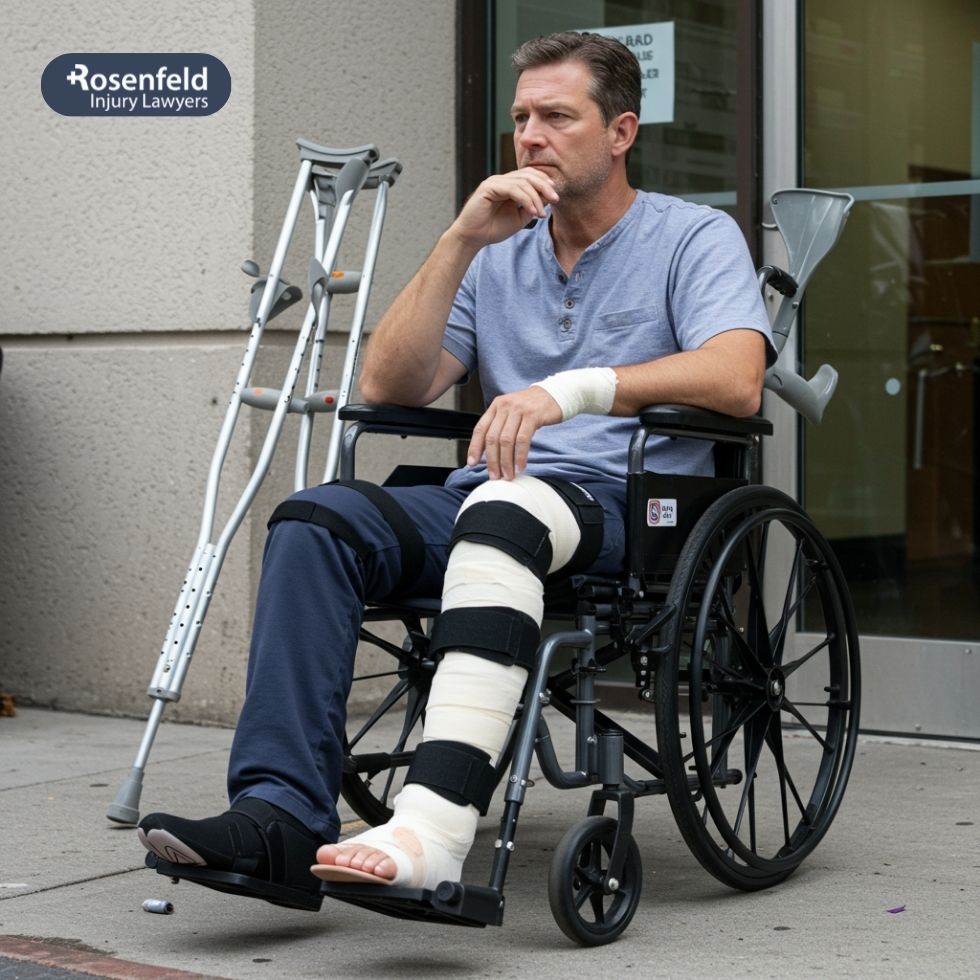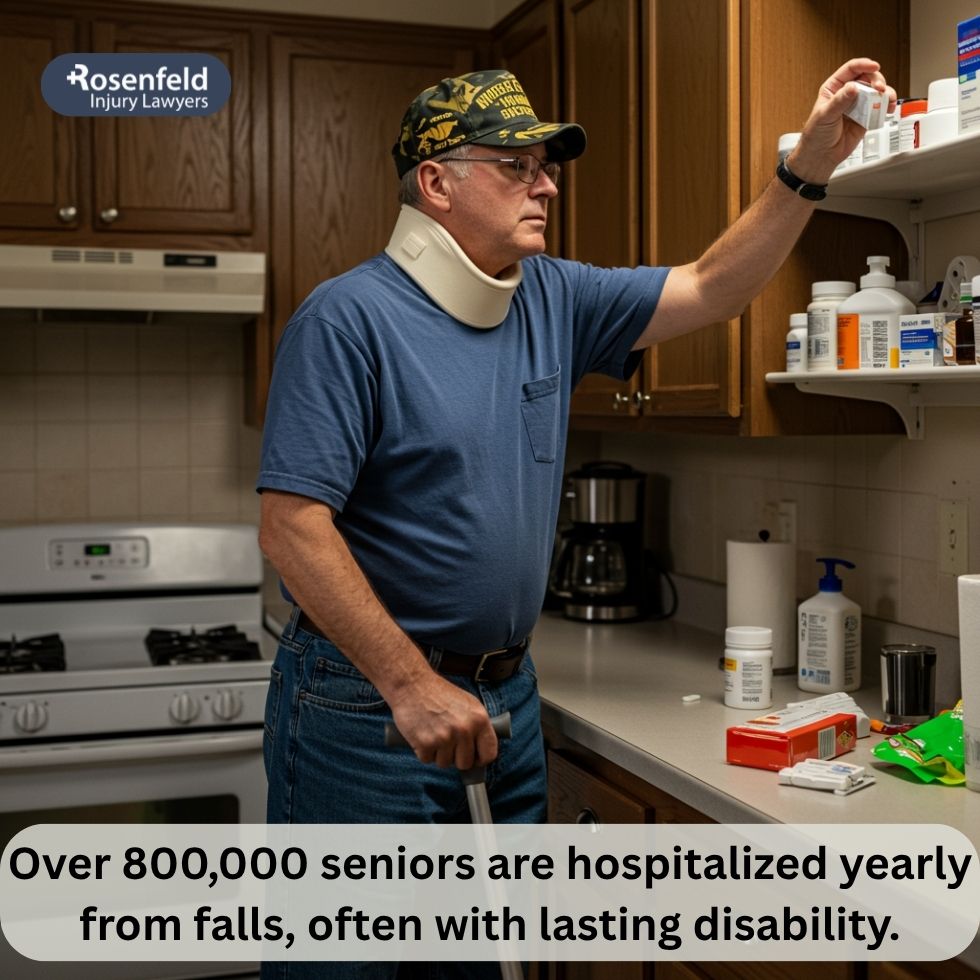Disability in Slip and Fall Cases
Disability in slip and fall cases depends on whether you were disabled prior to the accident and who can be held liable. The Illinois Premises Liability Act allows injury victims to seek compensation for their economic and non-economic damages.
It’s crucial to work with a top-rated legal team that can thoroughly investigate the property owner’s negligence. Contact Slip & Fall Injury Lawyers today for a free consultation.

Who Is Liable for Slip and Fall Accidents Involving Permanently Disabled Victims?
When slip and fall accidents happen to individuals with a permanent disability, both state and federal laws become involved. First, the Illinois Premises Liability Act (740 ILCS 130/2) requires property owners to fix or prevent dangerous conditions on their premises.
If the property owner knew or could reasonably foresee that things like poor lighting or uneven stairs could lead to serious injury, they could be liable. Additionally, disabled individuals are protected under the Americans with Disabilities Act (ADA), which requires that publicly accessible buildings accommodate individuals with mobility challenges or impaired vision.
Slip and fall accidents that result from accessibility issues on someone else’s property, such as unmarked elevation changes, can open the property owner up to lawsuits based on discrimination under the ADA.
However, this argument may not work if the injured party was hurt on municipal property. In Bruns v. City of Centralia,the Illinois Supreme Court ruled that the city cannot be held liable for injuries resulting from obvious hazards, such as cracked pavement caused by tree roots.
How Slip and Fall Accidents Can Lead to Disability
Slip and fall accidents can lead to severe injuries that may be permanently disabling or life-threatening.
For example, skull fractures can result from a slip and fall, potentially leading to a traumatic brain injury and permanent impairment. Spinal cord injuries may result if the person falls from a significant height, such as down a flight of stairs. Other common disabilities resulting from falls include broken bones, nerve damage, muscle damage, and herniated discs.
Compensation in Slip and Fall Injury Cases Involving Disability
You have several options after a slip and fall accident, depending on whether you had a prior disability and whether you suffered severe injuries.
Social Security Disability Income (SSDI): SSDI provides monthly payments to individuals with a qualifying work history who are disabled. You must have worked for at least 5 years in the past 10 years to qualify; however, those under the age of 24 may have a shorter work history. You may be able to continue working even if you are receiving SSDI.
Supplemental Security Income (SSI): You may be eligible for Supplemental Security Income if you make less than $2,019 from employment and have a qualifying disability. However, payments such as Social Security and SSDI can be considered as income.
Personal Injury Lawsuit: With these cases, you must prove that the property owner failed to rectify serious issues that could have resulted in injury. Our personal injury lawyers are highly skilled in litigating these cases, including proving the property owner’s negligence and calculating your damages.
How a Slip and Fall Lawyer Can Help
Our award-winning lawyers will assist you with all aspects of your lawsuit, from determining whether you have a valid claim to representing you at trial. We have secured over $490 million in settlements and verdicts across 5,000 successful cases, earning us a 10/10 AVVO rating and the prestigious Super Lawyers distinction.
When you work with us, you can expect the following services.
Case Evaluation: We will determine whether you have a valid claim and assess all mitigating factors, such as the location of the accident. Our team will also identify all potentially liable parties and notify them of your intent to sue.
Assessing Damages: Using your medical bills, lost wages, and other information, we’ll develop a demand letter for the liable party’s insurance. This will include your pain and suffering damages as well as a full account of the accident.
Gathering Evidence: Our team will review medical records, witness statements, surveillance footage, photos of the accident scene, and maintenance records to gain a comprehensive understanding of how the accident occurred. We will also work with expert witnesses to prove liability.
Documentation and Paperwork: We will file a complaint with the appropriate court, such as the Circuit Court of Cook County in Chicago, and write a demand letter to the applicable insurance company.
Negotiation: The insurance agency wants to ensure you do not receive fair compensation, meaning you need top-rated legal assistance. We will aggressively negotiate for you using meticulous evidence.
Trial Representation: Many cases settle out of court, but sometimes it’s necessary to go to trial. We will file motions, attend hearings, take depositions, and share your side of the story with a judge and jury.
How to Strengthen Your Slip and Fall Disability Claim
Your actions immediately after an accident can significantly impact whether you can secure compensation. Follow these steps as soon as possible.
- Seek immediate medical treatment, such as at Loyola University Medical Center.
- Take photos and videos of the accident scene, which can demonstrate the property owner’s failure to maintain a safe environment.
- Contact the police to document the incident.
- Gather witness contact information so that your attorney can follow up.
- Keep records of your lost wages and medical bills. Document your recovery through photos, videos, and personal accounts.
- Do not speak to insurance companies or other third parties without your attorney present.
- Contact a skilled premises liability attorney as soon as possible for a free case review.
How Do I Prove Liability in a Premises Liability Case?
Civil cases hinge upon liability, which requires proving negligence. This legal doctrine has four factors: duty of care, breach of duty, causation, and damages.
Duty of Care: Property owners are required to take reasonable care to prevent injuries on their premises. Places that are open to the public, such as the Shedd Aquarium or Mariano’s grocery stores, must also comply with all ADA standards, such as curb cuts and proper lighting.
Breach of Duty: The property owner failed to uphold their duty of care. This could be failing to maintain sidewalks or not checking that banisters were secure.
Causation: You would not have been injured, or would not have suffered such severe injuries, had the owner upheld their duty of care.
Damages: You suffered financial or emotional losses due to the accident, including medical bills, lost income, pain and suffering, or loss of enjoyment of life.

What Damages Can Be Recovered in a Slip and Fall Claim?
You may recover both economic and non-economic damages in a personal injury lawsuit, including:
- Medical bills
- Ongoing medical expenses, like physical therapy
- Lost wages
- Future lost income
- Property damage
- Funeral and burial expenses for wrongful death
- Emotional distress
- Pain and suffering
- Loss of enjoyment of life
- Loss of companionship
How Long Do I Have to File a Premises Liability Claim in Illinois?
In general, you have two years to file a premises liability case after a slip and fall accident (735 ILCS 5/13-202). However, there are sometimes exceptions, such as if you were seriously incapacitated after the accident and could not file in a timely manner. Contact us immediately for legal guidance so that we can begin the claims process.
Consult Our Chicago Slip and Fall Attorneys
Our top-rated personal injury lawyers fight for the rights of slip and fall accident victims on a contingency fee basis, ensuring everyone has access to high-quality legal representation. Start the legal process today by contacting us for a free consultation.
Content reviewed by Chicago slip and fall accident lawyer Jonathan Rosenfeld of Rosenfeld Injury Lawyers LLC, who holds property owners and management companies accountable to obtain justice for injured visitors and tenants, and is a trial lawyer recognized by Super Lawyers, Lawyer Legion, and Distinguished Justice Advocates for premises liability litigation.







